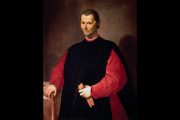
"It’s not based on any particular data point," a Treasury Department spokeswoman told Forbes.com concerning how the figure of $700 billion was arrived at for the financial bailout package. "We just wanted to choose a really large number."
Choosing a "really large number" helps, of course, if one is trying to convince the American public that the nation is facing a really large emergency, and that the government must be given really large powers and really large sums to deal with the emergency. Which is why governments love emergencies and crises, whether real or imagined.
Over the past few weeks, Treasury Secretary Henry Paulson has led a team of Henny-Penny alarmists sowing panic over the troubled financial markets. "The sky is falling, the sky is falling, and only massive emergency government intervention can save us," they claimed in so many words.
The panic strategy worked, and the Henny Pennies have won — for now. On Friday, October 3, despite massive public opposition to the bailout (with members of Congress and media organizations reporting that calls were running 100 to 1 against), the House of Representatives followed the Senate’s lead and approved the so-called Emergency Economic Stabilization Act of 2008, which may prove to be one of the biggest wealth-transfer schemes in history. On October 4, Bloomberg.com reported:
The House approved the measure 263-171 yesterday, four days after rejecting an earlier version by 228 to 205. The bill’s defeat caused a 778-point drop in the Dow Jones Industrial Average, prompting dozens of lawmakers to switch their vote on the package, the government’s largest step into the markets since Franklin Roosevelt’s New Deal.
Another "New Deal"?
The Bloomberg reference above comparing the current bailout to FDR’s New Deal is chilling to all who are even remotely familiar with the tyrannical powers and policies that accompanied the Roosevelt revolution.
Some important insights into that important era have been provided by Roosevelt’s Secretary of the Treasury Henry Morgenthau, whom FDR affectionately referred to as "Henny Penny," a moniker which was then picked up by the press and affixed to the treasury secretary. In his private diary, "Henny Penny" told of the strange daily ritual known as the "bedside conference" that greatly affected the economy of the entire nation and, indeed, much of the world. According to Secretary Morgenthau, he and Jesse Jones, head of the federal Reconstruction Finance Corporation, would meet in the morning in the president’s bedroom, where Roosevelt ate his breakfast in bed from a tray. The three of them would then proceed to set the daily price of gold. Here’s how Morgenthau described the process in his diary: "The actual price of gold on any given day made little difference. The amounts settled on were generally arbitrary. One day, for instance, the bedside conference decided on a rise of 21 c[ents]; ‘It’s a lucky number,’ the President remarked, ‘because it’s three times seven.’"
Morgenthau commented: "If anybody ever knew how we set the gold price through a combination of lucky numbers and so forth, I think they would really be frightened."
Contrary to Henny Penny Morgenthau’s diary claim, the price of gold on any given day made a great deal of difference — which was the whole point of the daily bedside conference. Having already confiscated all gold from the American people by executive fiat, FDR’s Brain Trust then proceeded to steal the people’s wealth through the hidden confiscatory tax of inflation. The great gold robbery had been effected by Roosevelt’s Executive Order 6102, of April 5, 1933, which, invoking the ongoing "national emergency," declared: "All persons are hereby required to deliver on or before May 1, 1933, to a Federal Reserve Bank or a branch or agency thereof … all gold coin, gold bullion and gold certificates."
Refusal to comply could earn one a $10,000 fine (a king’s ransom in 1933 dollars) and/or 10 years in the federal slammer. Upon delivering their gold, owners were paid the official price of $20.67 per ounce of gold. However, FDR and his bedside conferees then immediately began upping the price of gold, thus devaluing the dollars they had just paid to the former gold owners. Before long, they had pegged gold at $35 per ounce, by which point they had already robbed the American public of more than 40 percent of the value of their cash and savings. Reveling in their new-found powers, the Brain Trusters took great delight in dictating not only the price of gold, but of virtually everything else, as well.
It had all started under circumstances eerily similar to those we face today, and to the same bipartisan, power-grabbing tune the pipers are playing now. The Emergency Bank Act of 1933 was whisked through Congress sight unseen on a voice vote. House Minority Leader Bertrand H. Snell (R-N.Y.) urged Republicans to vote for Roosevelt’s plan because "the house is burning down, and the President of the United States says this is the way to put the fire out." Rep. Ernest Lundeen of the Minnesota Farm Labor Party, one of the few who refused to cave in to FDR’s legislation-by-hysteria campaign, rebuked his fellow members of Congress for their willingness to pass a bill they had not seen, read, or debated. He noted that the bill had been "driven through the House with cyclonic speed," and argued: "We must not allow ourselves to be swept off our feet by hysteria."
But hysteria triumphed and arbitrary power was unleashed in a profusion of new government agencies exercising dangerous and unconstitutional powers: the Office of Price Administration (OPA), the Office of Production Management (OPM), the National Recovery Administration (NRA), the Agricultural Adjustment Administration (AAA), the Surplus Commodity Corporation (SCC), etc. FDR’s new hydra-headed FedGov monster, led by the likes of Henny Penny Morgenthau, General Hugh Johnson, Leon Henderson, Henry Wallace, and Rexford Guy Tugwell, proceeded to redesign and restructure America according to the collectivist thinking of the times. They all were enamored of the supposed wonders produced by central planning under Stalin and Mussolini, and could barely contain themselves in anticipation of the opportunity to exercise the same god-like powers.
Like Morgenthau, FDR’s Labor Secretary Frances Perkins, through her diary entries, provided a revealing and disturbing glimpse into the inner workings of the Roosevelt Brain Trust. "At the first meeting of the Cabinet after the President took office in 1933," wrote Perkins, "the financier and advisor to Roosevelt, Bernard Baruch, and Baruch’s friend, General Hugh Johnson, who was to become the head of the National Recovery Administration, came in with a copy of a book by Gentile, the Italian Fascist theoretician, for each member of the Cabinet, and we all read it with care."
Of course, admissions such as those by Morgenthau and Perkins did not publicly surface until years after the fact. Likewise, it was decades later when the secret, decoded NSA transcripts known as the Venona documents were released, confirming that high-level Roosevelt administration officials and some of FDR’s most intimate confidants were actually Soviet agents. Like the Henny Penny of childhood fable, Morgenthau had his Turkey Lurkey, Goosey Poosey, and Cocky Locky. As it turns out, his policies aimed at nationalizing and socializing our economy had, for the most part, been hatched by his right-hand man, communist agent Harry Dexter White. And the AAA, which sent an army of bureaucrats onto America’s farms to confiscate, slaughter, and bury millions of pigs and cattle and millions of tons of grains and produce while much of America went hungry — well, those grand schemes under Agriculture Secretary Henry Wallace (an ardent and professed socialist) were the brainchildren of actual Soviet agents in the Agriculture Department such as Lee Pressman, Nathan Witt, Donald Hiss, Victor Perlo, and John Abt.
All of which proves the wisdom of our Founding Fathers against succumbing to appeals to concentrate power — even in (rather, especially in) times of supposed emergency. For those who make such appeals, once unbound from the chains of the Constitution, invariably show by their actions to be holding to a secret agenda far different from the beneficent one they had professed. "To take a single step beyond the boundaries thus specially drawn around the powers of Congress," cautioned Thomas Jefferson, "is to take possession of a boundless field of power, no longer susceptible of any definition." Or, as George Washington similarly warned: "Arbitrary power is most easily established on the ruins of liberty abused to licentiousness."
Is there a hidden agenda behind the appeals for arbitrary power by Henry "Henny Penny" Paulson, Ben "Turkey Lurkey" Bernanke, George "Goosey Poosey" Bush, and their bipartisan barnyard menagerie choir? Of that you can be certain. And as with Congress in 1933, you can be certain that virtually none of the 263 members of Congress who voted for the Emergency Economic Stabilization Act of 2008 on October 3 had even read, let alone studied and digested, the 451-page piece of legislation and the "boundless fields of power" it has opened to licentious abuse.
AP Images




